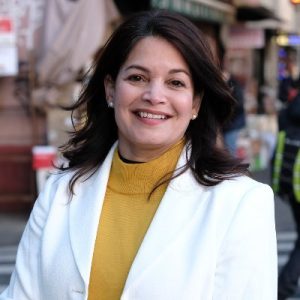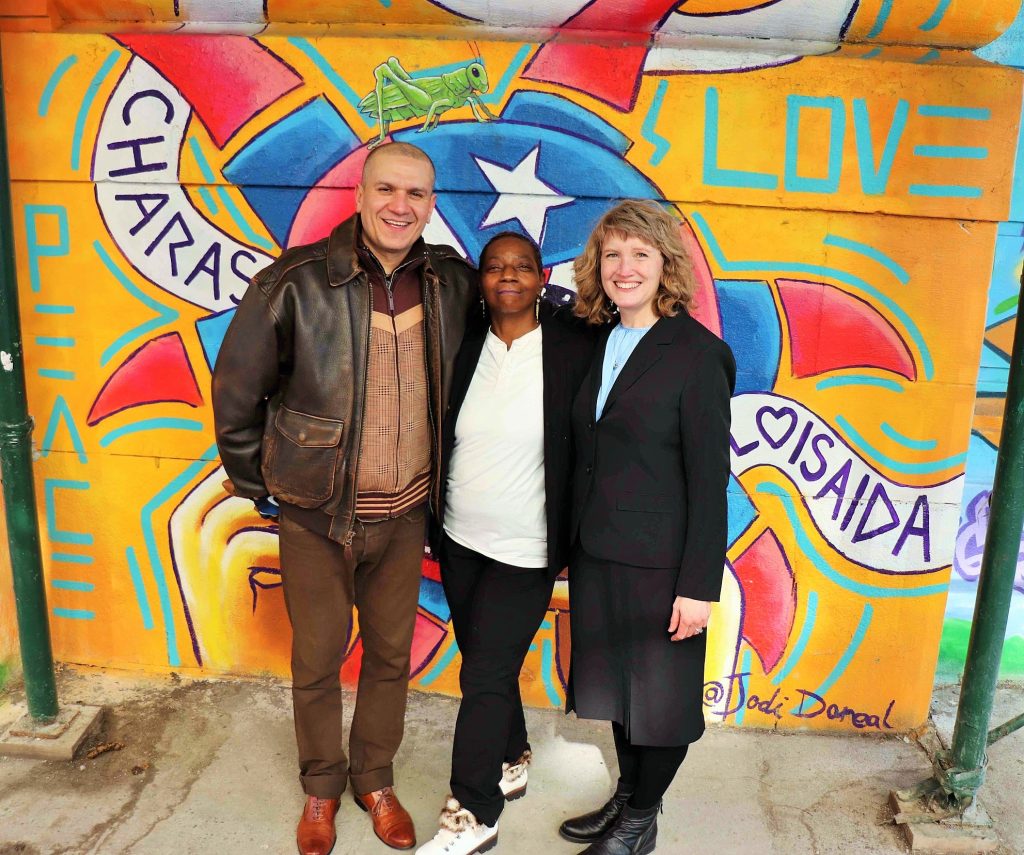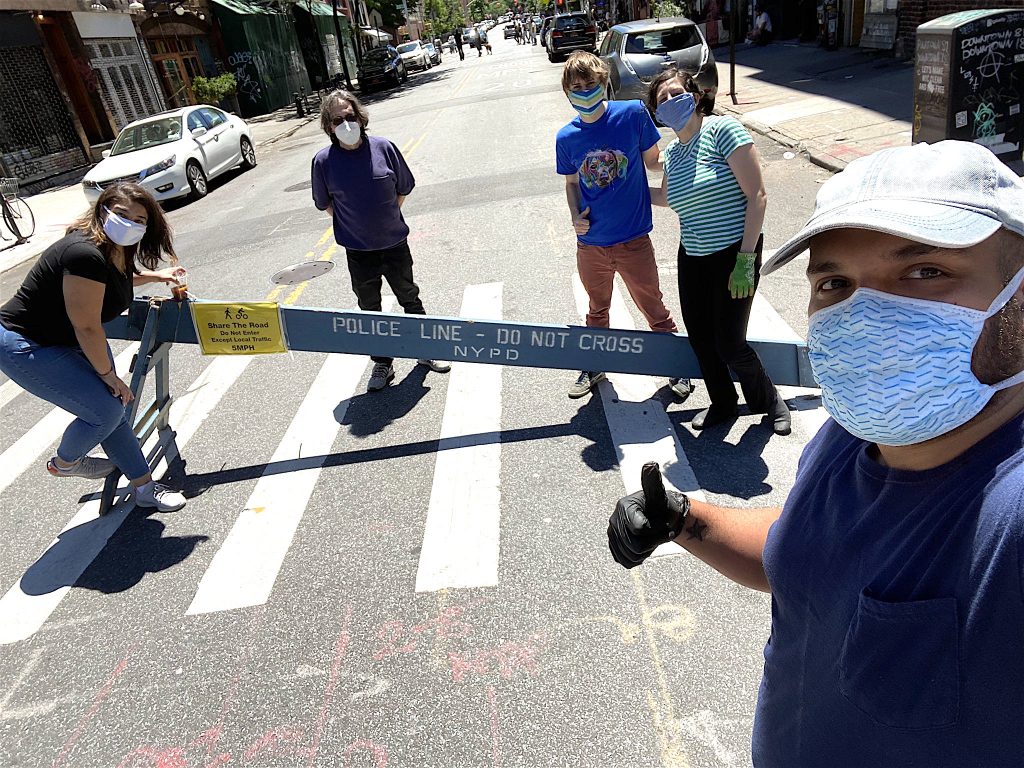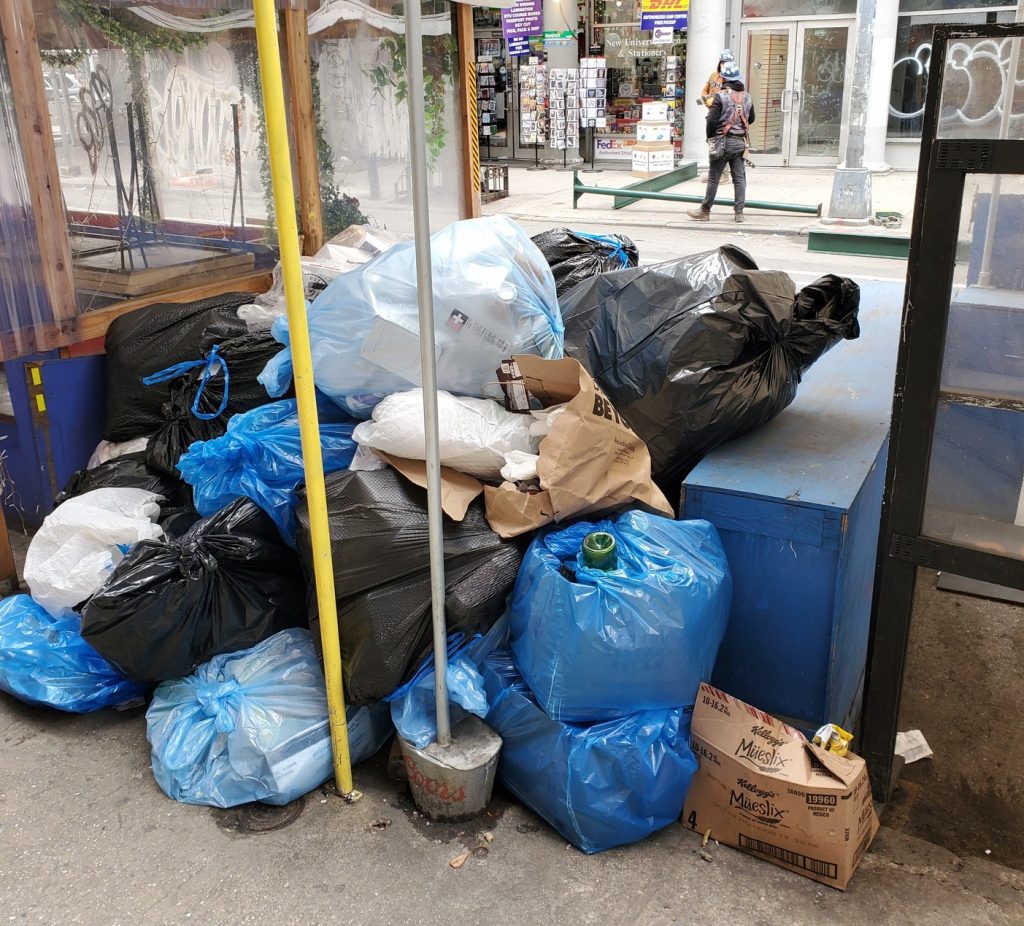BY LINCOLN ANDERSON | This “summer in the city” is about more than just the “back of your neck gettin’ dirty and gritty” (as John Sebastian sang). There are primary elections on the ballot for Tues., June 27. And early voting starts Sat., June 17.
Due to City Council redistricting in 2020 to adjust for population shifts, councilmembers’ usual four-year terms were cut to two years for this cycle, so incumbents who are being challenged by opponents face primary elections. (Four-year terms will resume in 2025.)
In two Downtown districts, Democratic Councilmembers Carlina Rivera and Christopher Marte have challengers on the ballot. Erik Bottcher, Downtown’s other councilmember, does not face a primary election in the West Side’s District 3.
Rivera, who grew up on the Lower East Side, has represented Council District 2 since 2018. The mostly East Side district includes the East Village, the Baruch Houses on the Lower East Side and Gramercy and stretches up to E. 33rd Street in Kips Bay. After redistricting, District 2 now also takes in more of Greenwich Village, including Washington Square Park, stretching all the way west over to Sixth Avenue between Houston Street and W. 15th Street.
If elected, this would be Rivera’s last Council term since she would be term-limited out of office. She made a spirited run for Congress in the new District 10 last year but Dan Goldman won the crowded Democratic primary, narrowly beating out former Assemblymember Yuh-Line Niou.
Running against Rivera this summer is Allie Ryan, an East Village community activist who opposed Rivera two years ago in the general election as an independent.
In Council District 1, Marte, another Lower East Side native, faces three opponents, Susan Lee, Pooi Stewart and Ursila Jung. (Voters will be able to put ranked-choice voting to use in this race.)


District 1 includes most of Manhattan south of Houston Street. With redistricting, the district lost all of its area north of Houston Street but picked up area along Grand Street and also a swath of public housing on the Lower East Side.
In addition, what had been shaping up to be a competitive race for district leader in the East Village is now in limbo after a petition-signatures challenge knocked candidates Francesco Gonzalez and Bridget Tuck off the ballot. The challenge was reportedly brought by attorney Paul Newell, himself a Lower East Side district leader, on behalf of Coalition for a District Alternative (CoDA). Newell did not respond to a request for comment.
The challenge was reportedly over a minor technicality: The words “male” or “female” — representing male or female district leader candidates — were written on their petitions but are now simply supposed to be indicated by the letters “M” or “F.”
Attorney Arthur Schwartz, a Greenwich Village district leader, has been representing Gonzalez and Tuck, trying to get them onto the ballot. Schwartz, although facing no opposition, was also almost tossed off the ballot for a similar technicality.
“I know one thing,” Gonzalez said. “CoDA is terrified of my campaign. They are trying their best to get me off the ballot because they know I will win.”
The CoDA candidates for district leader are incumbent Aura Olavarria and Marquis Jenkins, who is running to fill the open seat for male district leader.

The Village Sun asked Rivera and Ryan to write their answers to a series of questions about their positions on the issues. The Sun is reprinting some of their answers here:
The Village Sun: Carlina, why are you running for reelection?
Carlina Rivera: In my final two years in office, I want to continue to deliver on my robust record of legislation on issues such as housing, healthcare, reproductive justice, climate and worker protections. In partnership, this community and I have identified issues we must tackle — from the hyperlocal to the citywide level — that have led to successful expansions in city services that address important issues, such as sanitation, safety, education equity and reproductive freedom. We continue to work on critical legislation that will help ensure affordable, accessible and healthy homes, innovative initiatives to promote economic mobility, and programs that allow us to age in place with dignity. There is so much work in the pipeline that we can finish, for the good of all New Yorkers, but especially for our most vulnerable neighbors. I want to keep fighting for the community and city that I love.
V.S.: What are your top five campaign issues?
C.R.: Affordability. I want to stabilize and deepen affordability in our city, with special attention to healthcare and housing. This includes improving our public healthcare system and leveraging programs like community land trusts and middle-income home ownership.
Climate action. We must work quickly toward smart solutions to slow and defend against climate change.
Economic mobility. There is more we can do to expand educational and workforce opportunities that lead to greater access to growing industries, especially for New Yorkers that remain at the margins.
Safety. Although New York remains safe compared to other major U.S. cities, we must demonstrate action on preventative strategies on crime. Overflowing and unsafe jails with revolving doors are not the answer.
Cleaner communities. While I’ll continue to fund supplemental sanitation and composting services in our communities, we must take bolder steps to innovate our way to cleaner streets and reduced waste.
V.S.: What issues do you find are most important to local voters?
C.R.: I walk the streets and ride the bus through District 2 quite a lot and hear directly from neighbors. My office has also worked on tens of thousands of service requests and inquiries over the last five years. Residents talk to us most about housing — this includes unsafe conditions, NYCHA repairs, eviction prevention and questions impacting condos and co-ops. Other important issues include better parks, school facilities and sanitation services — which I have always funded directly — as well as street safety, public safety and noise. Many of the initiatives we have launched and models we have created are because of local and site-specific concerns. For example, we led a multi-stakeholder coalition to address homelessness and unsafe conditions in Tompkins Square Park. Additionally, legislation I’ve introduced and/or passed has frequently resulted from unique issues based on conversations with constituents.

V.S.: Carlina, you sponsored the law to make Open Streets permanent in NYC. There is a federal lawsuit against Open Streets becoming permanent. Do you stand by the program, or does it need some modifications?
C.R.: The main issue with Open Streets is the city failing to provide sufficient resources to the volunteer stewards working so hard to make them a success. It isn’t just about closing a street or limiting car traffic — it’s about enhancing the cultural, educational and fitness programming landscape that complements the area around it. This is distinguished from Open Restaurants, which is currently under review and for which I have called for an additional public hearing. I am proud to support constituents who work to maintain their local Open Street program. In the case of Avenue B’s Open Street, it is adding an open space amenity to Tompkins Square Park without detracting from the park’s well-used and full array of passive and recreational offerings.
V.S.: A big complaint among cyclists is mopeds, e-bikes, motorcycles, etc. using the bike lanes. Should these vehicles be allowed in the bike lanes? If e-bikes, specifically, are to use bike lanes, does their speed need to be capped?
C.R.: New York City already has speed limits for e-bikes and mopeds and rules about which vehicles may use bike lanes. They are clearly stated on D.O.T.’s [Department of Transportation] Web site. Some of my state colleagues, including ones who championed the state law legalizing e-bikes, recently publicized a valid observation: Local jurisdictions have a duty to educate all riders about the rules of the road. The city and, importantly, delivery companies have not done nearly enough to ensure riders know and follow these rules — and the little they do is often not done in the languages spoken by an incredibly diverse ridership. Safe streets require fierce education campaigns targeting all operators, including drivers, since cars remain by far the deadliest vehicle type. For the record, e-bikes are allowed in bike lanes, while mopeds must ride in shoulders or traffic lanes.
V.S.: Allie, why are you running for election?
Allie Ryan: For 20 years my husband and I (and now my daughters) have lived here while we pursued our art. I became fed up with Mayor de Blasio working with my opponent to ignore the community plan and push through an unnecessarily destructive and time-consuming East River Park resiliency project, and when they both took money for their campaigns from real estate developers seeking approvals and entitlements for land-use deals to build more luxury apartments.
V.S.: What are your top five campaign issues?
A.R.: Regulating e-bikes, dismantling the restaurant sheds, protecting our precious green space, building more affordable apartments and repairing public housing.

V.S.: What issues do you find are most important to local voters?
A.R.: Improving our quality of life, helping small businesses, fighting crime and electing officials who listen to their constituents. Ask yourself if you are better off now after being represented over the past six years by a career politician?
V.S.: Carlina sponsored the law to make Open Streets permanent in NYC. There is a federal lawsuit against Open Streets becoming permanent. Do you support or oppose the program, or does it need some modifications?
A.R.: Open Streets was clearly designed to provide political cover for the privatization of public spaces, whether it was to please the restaurant and hospitality industry or well-funded tech and bicycle lobbyists. It needs many modifications before I can support it.
V.S.: A big complaint among cyclists is mopeds, e-bikes, motorcycles, etc. using the bike lanes. Should these vehicles be allowed in the bike lanes? If e-bikes, specifically, are to use bike lanes, does their speed need to be capped?
A.R.: I ride my human-powered bicycle every day. People have died from e-bike battery fires and people have to be on high alert to avoid being hit by these silent, lawless, high-speed non-necessities. We need real enforcement. E-bikes and e-scooters need to get licenses and be regulated. Camera violations should be used safely to enforce the rules of traffic. And if people do not abide by the rules, they should lose their license, just like anyone else operating a motorized vehicle. The bike lanes should be safe enough for even our children to use. We are far from that goal. At the very least, seniors need to be able to safely cross the streets.
[End of Q&A with Rivera and Ryan]
As for the District 1 race, Councilmember Marte said his number one issue is affordable housing, noting, “We have a dozen to two dozen people walking into our office every day and talking about housing.” Other top issues for him include sanitation, worker safety and protection — he co-sponsored legislation to regulate 15-minute delivery apps, saying they encourage speeding — plus fighting upzoning, such as at Two Bridges.
“Even though people are saying it’s a done deal, the towers haven’t gone up,” he said of the hotly opposed Two Bridges large-scale development plan.
Marte has also been a vocal critic of the city’s plan to demolish the Manhattan Detention Center a.k.a. The Tombs and build a new borough-based jail in its place.
“We’ve been organizing and putting a lot of pressure to do adaptive reuse at that location,” he said of The Tombs.
Susan Lee, seen as Marte’s strongest opponent by some, is calling for greater public safety — including a crackdown on anti-Asian and anti-Semitic hate crimes and violence — plus maintaining educational standards, among other issues. She supports Gifted and Talented programs in schools and also backs keeping the Specialized High School Admissions Test. Lee was a leading voice against the city putting a homeless shelter at the former Best Western hotel on Grand Street. The site is now being used to help shelter some of the waves of immigrants from the southern border.
“As a lifelong New Yorker, I have seen the best of times and the worst of times,” Lee said. “And I know our city will recover but it will take hard work and dedication. In a time of unprecedented challenges, strong, effective leadership is more critical than ever.”
The other two District 1 candidates, Jung and Stewart, for their part, also listed as their top issues, public safety, high-quality schools and supporting small business.
In the District 2 race, as she did two years ago, Rivera recently ducked debating Ryan at a candidates event hosted by Village Preservation. The preservation group and its leader, Andrew Berman, have been on the outs with Rivera ever since Berman accused her of reneging on a campaign pledge to push to rezone the area south of Union Square in connection with a rezoning to allow the new “Tech Hub” on E. 14th Street. By blowing off the Village Preservation event, Rivera missed the chance to respond to Ryan’s accusation that Rivera “lied” on the rezoning issue.
In District 1, Lee recently snagged the endorsement of District Council 37, the powerful municipal employees’ union, and has the backing of the United Democratic Organization, Chinatown’s main political club.
However, supporters say Marte will be tough to beat.
“He’s a rock star in Chinatown,” said David Gruber, a former chairperson of Greenwich Village’s Community Board 2 and one of Marte’s most vocal backers.
In general, the two Council incumbents don’t have much to worry about, according to Hank Sheinkopf, a veteran political strategist. Rather than a “summer rumble,” he described the primaries as more of a summer slumber.
“This will be a low-turnout, limited-interest election,” he predicted. “Marte knows how to organize and he’s worked to get that seat for a long time. Carlina Rivera — the woman running against her should save her money.”
However, former Councilmember Kathryn Freed, a mentor of sorts to Ryan, said it’s precisely this kind of primary that could see an upset.
“Yes, it’s a low-turnout election — a ‘dead election’ — which is why Allie might have a chance,” she said. “If she can convince people to get out and vote for her, she could pull it off — if you have an issue, and there are a number of issues. East River Park is an issue. Carlina getting the endorsement of Open New York is an issue; she was a prime sponsor of the upzoning of Noho — in the Soho/Noho/Chinatown rezoning — the first time they upzoned a historic district. Open New York is just real estate shills. And Allie is against the [dining] sheds. She’s in favor of regulating the e-bikes. For those of us who are older and frail, those e-bikes are frightening. They’re a threat — not to mention those ion batteries. Just the regular bikes cause problems. But e-bikes are three times as fast and heavier.”
Meanwhile, Rivera has the backing of current politicians Congressmember Jerrold Nadler, state Senator Brad Hoylman-Sigal, Borough President Mark Levine and the man who beat her in last year’s congressional primary, Goldman.
In District 1, Freed is supporting Marte. As for the petition challenge against Gonzalez and Tuck, she said, “If you have the requisite number of signatures, I kind of hate throwing people off the ballot on a technicality.”
